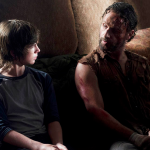Each week in The Female Gaze, Faith Newport engages the trends, events, and issues that affect women—and the men who care about them.
Has anyone else hit that phase where you don’t talk to your friends about the TV shows you watch because you’re worried about how unhip and bland you’ll seem if you admit to actually liking TV? Maybe it’s just me. Maybe it’s because I watch The Bachelor. I’ll admit it: The entire franchise is my ultimate guilty pleasure. Ever since I started watching (halfway through Brad Womack’s season), I haven’t missed an episode. I’m hooked. The drama, the exotic locales, the whirlwind of contrived romantic scenarios, the cat fights, the tears…
Something about the whole thing keeps me coming back.
For anyone not in the know, The Bachelor involves a large group of attractive single ladies all chasing the same guy. They have eight weeks to date this poor schmuck, and he sends some of them home each episode—and proposes marriage to the last girl standing. It’s like Survivor: Speed Dating. Seriously. But as ridiculously entertaining as the whole premise is, the show’s track record of creating lasting relationships is downright terrible.
Unsurprisingly, trying to date in front of thousands of people is not exactly a building block to success as a couple–but, sixteen seasons and two spin-off series after its original airing, The Bachelor seems to have a reasonable amount of staying power. It taps into something unique about the human experience—the desire to be loved and loved intimately. Every season brings a new crop of “contestants” who all assert on national television that they are desperate for love. While on dates, they scale cliffs, jump out of helicopters, swim with sharks, and go to any lengths needed to convince their potential partner that they are worthy. The most common question asked by the girls after being rejected is, “What’s wrong with me?”
That’s the problem with our sexuality: It impacts our identities, but it can’t provide a basis for them, no matter how much we want it to. We all want to be chosen, we all want to feel worthy. The conflict between this desire we have and the reality of not having it is intense, enough to drive us to try to fill that void. So we look at porn. We become codependent. We stay with the wrong person. We act promiscuously. Or we audition for reality TV shows. The desire for love is built into us like it was built into Adam, and it’s incredibly tempting to evaluate ourselves in relation to other people.
Having love feels like validation. It feels like empowerment or self-actualization.
And it can be all of the above, but we tend to go about it in the wrong order. True love begins with a sense of yourself and your identity outside of your sexuality and your relationships. It starts with knowing who you are, both generally and spiritually. All of our other relationships are born out of this one foundational thing: how we perceive ourselves and how we perceive (or don’t perceive) God. And, yes, those are intimately tied together as one. That is our identity, and only after having found security in it can we successfully enter into happy, healthy relationships.
Finding love isn’t nearly as urgent when you already know that you’re loved by Someone else. If there’s anything that can take the desperate out of dating, it’s the peace that comes alongside that knowledge. Cultural phenomenons like The Bachelor perpetuate a false idea of “happily-ever-after” partnerships—marriages and relationships that provide ultimate fulfillment. I’d say I’m quite happy in my own “ever-after,” but it’s because I’ve found satisfaction outside of my relationship, not just inside it.











